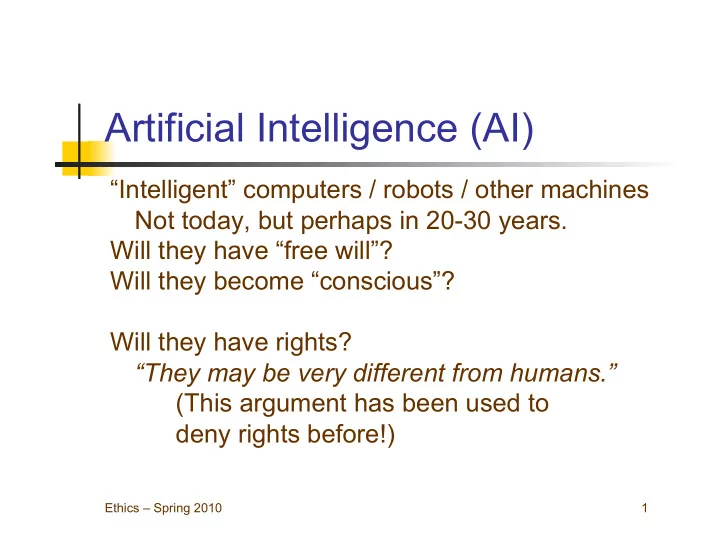

Artificial Intelligence (AI) “Intelligent” computers / robots / other machines Not today, but perhaps in 20-30 years. Will they have “free will”? Will they become “conscious”? Will they have rights? “They may be very different from humans.” (This argument has been used to deny rights before!) Ethics – Spring 2010 1
Technology and the Workforce Income Gap is increasing. A pervasive sense of meaninglessness. The individual has little personal control. People are taking orders from machines. Ethics – Spring 2010 2
Increasing Complexity Imagine a future of incredible technical complexity. No one understands “the system”. Humans can’t control the future. Humans can’t predict the future. Humans can’t fix the system when it breaks. Ethics – Spring 2010 3
The Singularity Ray Kurzweil Progress is increasing exponentially. (see next slide) Before we know it, things change so fast we can’t react. Something big happens to society Computers take over? Ethics – Spring 2010 4
Ethics – Spring 2010 5
Ethics – Spring 2010 6
Computers Take Over A Future Vision: Technology becomes vastly more complex. AI computers take over control of Earth. Humans may/may not even know it. Who was responsible? Are today’s technologists culpable? Ethics – Spring 2010 7
Non-Linear Behavior • Interconnectedness • Feedback • Amplification System may go “Non-Linear” A small perturbation can cause a huge transition / “phase change” Ethics – Spring 2010 8
Growth of the Economy Technology enables more production … which enables larger populations … which then suck up the production. Greater productivity leads to more people, not more individual wealth. Is a higher population necessarily better? Is this some that can/should be controlled? Ethics – Spring 2010 9
Impact on Relationships Humans like to “commune” with others. Electronic companionship Today: Screen time is replacing talking. Future: Robotic companions? Automated / virtual sex partners Will this lead to isolation or greater overall happiness ? Ethics – Spring 2010 10
Manipulating Humans Might we soon have technologies that we don’t understand at all? Might we have technologies that no one even knows exist? Ethics – Spring 2010 11
Manipulating Humans Computers / technology / new theories … might allow humans to be manipulated in ways they don’t even detect. “Subconscious / subliminal suggestion” Subtle marketting / personalized ads. Will “free will” become unimportant? Ethics – Spring 2010 12
Manipulating Humans Entertainment Future: Addictive Technologies • 3-D virtual worlds that people don’t want to ever leave” • Technologies we can’t foresee? Ethics – Spring 2010 13
Manipulating Humans Behaviorism: Use reward and punishment to get people to do what you want. People who purchase a lot get rewarded in ways they don’t understand or know. Buy new shoes: win at video games, get virtual-world rewards. Fail to consume: Your fast food diet is customized toward blandness, etc. Ethics – Spring 2010 14
Centralized Databases Contain lots of personal information: List of friends, sex partners, etc. Psychological profile, IQ, etc. Criminal tendencies Appraisals of loyalty to the party, etc. Ethics – Spring 2010 15
Centralized Databases What books you’ve purchased / read What classes you’ve taken / grades E-mails you’ve viewed / websites visited. Movies / TV shows viewed. Who your friends are and what they know. In short: What information you have! Ethics – Spring 2010 16
Centralized Databases DB complexity, # of DBs Implossible for individuals to detect or correct erroneous information! Ethics – Spring 2010 17
Recommend
More recommend